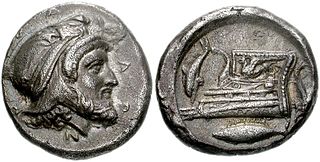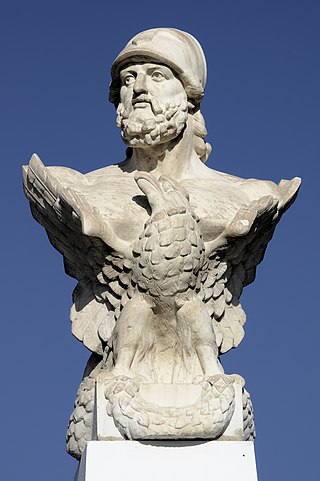
The Second Peloponnesian War, often called simply the Peloponnesian War, was an ancient Greek war fought between Athens and Sparta and their respective allies for the hegemony of the Greek world. The war remained undecided until the later intervention of the Persian Empire in support of Sparta. Led by Lysander, the Spartan fleet finally defeated Athens which began a period of Spartan hegemony over Greece.

The 5th century BC started the first day of 500 BC and ended the last day of 401 BC.
This article concerns the period 429 BC – 420 BC.
This decade witnessed the continuing decline of the Achaemenid Empire, fierce warfare amongst the Greek city-states during the Peloponnesian War, the ongoing Warring States period in Zhou dynasty China, and the closing years of the Olmec civilization in modern-day Mexico.
This article concerns the period 399 BC – 390 BC.
This article concerns the period 379 BC – 370 BC.
This article concerns the period 389 BC – 380 BC.
Year 410 BC was a year of the pre-Julian Roman calendar. At the time, it was known as the Year of the Consulship of Mamercinus and Volusus. The denomination 410 BC for this year has been used since the early medieval period, when the Anno Domini calendar era became the prevalent method in Europe for naming years.
Year 394 BC was a year of the pre-Julian Roman calendar. At the time, it was known as the Year of the Tribunate of Camillus, Poplicola, Medullinus, Albinus, Mamercinus and Scipio. The denomination 394 BC for this year has been used since the early medieval period, when the Anno Domini calendar era became the prevalent method in Europe for naming years.
Year 381 BC was a year of the pre-Julian Roman calendar. At the time, it was known as the Year of the Tribunate of Camillus, Albinus, Albinus, Medullinus, Flavus and Ambustus. The denomination 381 BC for this year has been used since the early medieval period, when the Anno Domini calendar era became the prevalent method in Europe for naming years.

The King's Peace was a peace treaty guaranteed by the Persian King Artaxerxes II that ended the Corinthian War in ancient Greece. The treaty is also known as the Peace of Antalcidas, after Antalcidas, the Spartan diplomat who traveled to Susa to negotiate the terms of the treaty with the king of Achaemenid Persia. The treaty was more commonly known in antiquity, however, as the King's Peace, a name that reflects the depth of Persian influence in the treaty, as Persian gold had driven the preceding war. The treaty was a form of Common Peace, similar to the Thirty Years' Peace which ended the First Peloponnesian War.

Isocrates was an ancient Greek rhetorician, one of the ten Attic orators. Among the most influential Greek rhetoricians of his time, Isocrates made many contributions to rhetoric and education through his teaching and written works.

The Battle of Cnidus was a military operation conducted in 394 BC by the Achaemenid Empire against the Spartan fleet during the Corinthian War. A fleet under the joint command of Pharnabazus and former Athenian admiral, Conon, destroyed the Spartan fleet led by the inexperienced Peisander, ending Sparta's brief bid for naval supremacy.
Evagoras or Euagoras was the king of Salamis in Cyprus, known especially from the work of Isocrates, who presents him as a model ruler.

Cimon or Kimon was an Athenian strategos and politician.

Tiribazus, Tiribazos or Teribazus was an Achaemenid satrap of Armenia and later satrap of Lydia in western Anatolia.

Teleutias was the brother of the Spartan king Agesilaus II, and a Spartan naval commander in the Corinthian War. He first saw action in the campaign to regain control of the Corinthian Gulf after the Spartan naval disaster at Cnidus in 394 BC, and was later active in the Spartan campaign against Argos in 391 BC. Later that year, he was dispatched to the Aegean to take command of a Spartan fleet harassing Rhodes. Once in command, he attacked and seized a small Athenian fleet sailing to aid Evagoras I of Salamis, Cyprus, then settled in to attack Rhodes with his newly augmented fleet.
Nicocles was an Ancient Cyprian Greek king of Salamis, Cyprus. In 374/3 BC, he succeeded his (presumed) father Evagoras I. Nicocles continued the philhellenic politics of his father. Nicocles probably died together with Straton of Sidon during the revolt of satraps. He was followed as the Cypriot king of Salamis by his son Evagoras II.

Classical Greece was a period of around 200 years in ancient Greece, marked by much of the eastern Aegean and northern regions of Greek culture gaining increased autonomy from the Persian Empire; the peak flourishing of democratic Athens; the First and Second Peloponnesian Wars; the Spartan and then Theban hegemonies; and the expansion of Macedonia under Philip II. Much of the early defining mathematics, science, artistic thought, theatre, literature, philosophy, and politics of Western civilization derives from this period of Greek history, which had a powerful influence on the later Roman Empire. Part of the broader era of classical antiquity, the classical Greek era ended after Philip II's unification of most of the Greek world against the common enemy of the Persian Empire, which was conquered within 13 years during the wars of Alexander the Great, Philip's son.

Evagoras II or Euagoras II was a king of the Ancient Greek city-state of Salamis in Cyprus, and later satrap for Achaemenid Persia in Phoenicia.









